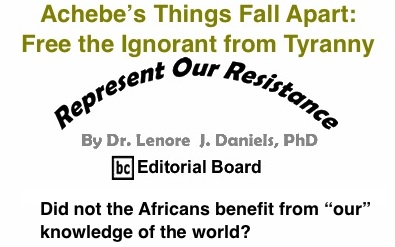




How do you think we can fight when our own brothers have
turned against us? The white man is very clever. He came quietly and peaceably
with his religion. We were amused at his foolishness and allowed him to stay.
Now he has won our brothers, and our clan can no longer act like one. He has
put a knife on the things that held us together and we have fallen apart.
- Okonkwo, protagonist, Things Fall Apart
He was writing a book, the newest District Commissioner of the village, Umoufia, Reverend Mr. James Smith, who succeeded the now
deceased Mr. Brown in the great project to establish civilization in
Brown’s
death could not have been more timely, considering
civilization project could not wait forever. Brown’s method was one of
“compromising and accommodating” the ignorant. He had studied the religion of
the Umoufia clan (Ibo) and concluded it was best not
to wage a “frontal attack” as the messenger before him had done, going so far
as to informing the natives that their traditional gods were “false gods, gods
of wood and stone.”
All the gods you have named are not gods at all. They are
gods of deceit who tell you to kill your fellows and destroy innocent children.
There is only one true God and He has the earth, the sky, you and me and all of
us.
They
are gods of deceit who tell you to kill your fellows and destroy innocent
children.
Brown’s
method of operation was different: he “built a school and a little hospital in Umoufia. He went from family to family begging people to
send their children to his school.”
Brown was
a humble man, a liberal of sorts.
The
villagers came around to his method; they wanted to learn. They came to the
church and to the school, but there was some rumbling and even more rumbling
among the elders when, to their surprise, “new churches were established in the
surrounding villages and a few schools with them.” The messengers of the new
god appeared “in the market place,” and the
It was
peculiar to the elders and others to discover that the head of the church “is
in
“From the
very beginning,” Brown concluded, “religion and education went hand in hand.”
Life in Umoufia followed traditions. There was the sacrifice of an
“innocent” child as settlement after conflict with a neighboring clan. The
elders set the terms, but the younger men who had to carry out the sacrifice
did so not without trepidation. It was a hierarchical society that rewarded the
brave and fearless warrior, but only a few acted without reflecting on the value
to the clan of their deeds.
Traditional
ceremonies placed men in authority. “There were many women, but they looked on
from the fringe like outsiders,” but the village’s Oracle was Agbala (a woman) and its priestess, Chialo,
was the “only living being who ever beheld Agbala.”
It was Chialo, too, who, when the “strangers” came,
waged her own battle against them, calling the converts to the new god and
church “the excrement of the clan.” But now Chialo
was denounced and women were to be seen but never heard. The District
Commissioner’s administration acknowledged the power of a supreme male god and
men to decide the fate of the civilization project in Umoufia.
Individual
self-reflection and communal discussions had left room for evolution.
Young
adults, as most young adults in any community, questioned the wisdom and
lessons of their parents and elders. Most were generally torn between the
stories told to them by their mothers, stories of “the tortoise and his wily
ways, and of the bird eneke-nti-oba who
challenged the whole world to a wrestling contest and was finally thrown by the
cat,” and stories told to them by fathers and village elders. “Masculine and violent” stories. Even if a young man
preferred the stories of his mother, he was reminded that such stories “were
for foolish women and children.” Now, most young, particularly young men, did not hesitate. Many flocked to the new churches and
schools.
For a man
like Rev. Smith, however, all this confusion and chaos was too volatile. Still
too many of the ignorant natives were thinking, opting out of cooperating. Uniformity, and quick! The world was black and white – “and
black was evil!”
It was a
“battlefield” and “the children were locked in mortal conflict with the sons of
darkness.” In his sermons, Rev. Smith “spoke...about sheep
and goats and about wheat and tares. He believed in slaying the prophets
of Baal.” For all Brown’s efforts, Smith saw an ignorant village, ignorant of
“the Trinity and the sacraments.” There was work to be done, and Rev. Smith,
“filled with wrath,” set out to display “demonstrations of power. In one
dramatic moment, he ordered the unmasking of “an eqwuqwu”
in public! Naturally, this scene of power horrified the villagers.
Under
Smith, the men of the District Commissioner’s administration “did not carry
guns,” for such a display was “too unseemly,” and when he spoke to the village
leaders of a “just” court “where we judge cases and administer justice...under
a great queen,” he made the leaders understand that this “peaceful
administration” is a gift to make them “happy.” But the leaders had to agree to
“cooperate.”
Many
decided to cooperate; others refused. Among them was the protagonist, Okonkwo, who with a small group of men, decided to take
action, to pick up arms and fight. But as always, there was discussion:
If we hit the “strangers,” we will “hit our brothers and
perhaps shed the blood of a clansman.”
In the
end, the group decided action was necessary.
“Our fathers never dreamed of such a thing. They never
killed their brothers. But a white man never came to them.”
While the
men were discussing, a messenger arrived and ordered them to stop the meeting. Okonkwo “drew his machete.”
Okonkwo stood looking at the dead man. He
knew that Umoufia would not go to war. He knew because
they had let the other messenger escape. They had broken into tumult instead of
action. He discerned fright in that tumult. He heard voices asking: ‘Why did he
do it?’
He wiped his machete on the sand and went away.
When Okonkwo was last seen, his body was dangling from a tree.
He hanged himself.
So ends
Chinua Achebe’s Things Fall Apart,
except for this:
“In the
book which he planned to write,” District Commissioner Rev. Smith reminded
himself not to include the “undignified details” such as “cutting a hanged man
from the tree.” He would not want the “natives” to hold a “poor” opinion of
him. He realized that everyday, he was gathering more and more material for his
book, and he was happy.
However,
the story of this man who had killed
a messenger and hanged himself would make interesting reading. One could almost
write a whole chapter on him. Perhaps not a whole chapter but
a reasonable paragraph, at any rate.
There
were more important matters to include in the book. “One must be firm in
cutting out details.” And “after much after thought,” he was proud of the title
of his book: The Pacification of the Primitive Tribes of the
On March
22, 2013, the Nigerian writer Chinua Achebe died.
It is no
accident that Achebe’ s Things Fall Apart, published in 1958, ends with
the beginning of a new book, written not by a village member, but by the
District Commissioner, privileging the interests and goals of Western
imperialism. His narrative offers a history of the Umoufia
that will imprint in the minds of white readers images of an ignorant people
freed from their own tyranny. The interests and goals of the “messengers,”
themselves agents of the Almighty - and the queen, legitimizes the use of violence,
physical, yes, and that violence of Western religion and education which
stipulates submission to and the consumption of a white-centered mindset.
It has been over 10 years since I taught Things Fall Apart. It had become one of those continuous texts in college classrooms because students preferred to focus on the sacrifice of the young boy as an example of violence - African violence. In the meantime, the violence of conquest, civilizing the ignorant, forcefully removing historical and cultural memory and privileging the history, culture, goals, and lives of the invaders, is what had to happen, yes. Did not the Africans benefit from “our” knowledge of the world?
How do
professors, white and Black, teach a text like Things Fall Apart? I
should re-phrase the question, on which parts of the book do whites focus? The sacrifice, the violence, or the “fringe” “outsider” position of
“African” women? From what perspective are Black professors allowed
to teach when and if this book is on their syllabus? Would these teachers direct students to consider the
Another
question I have is this: could Achebe have located a publisher for Things
Fall Apart today when the on-going conquest of hearts and minds continues?
Today, capitalism’s messengers (not all are death squad trainers, torturers,
CIA agents, drone operators but are even more effect) scourer the world in
search of those Black, Red, Brown, and Yellow writers in “former” colonies,
“former” enslaved “former” genocide survivors in the West, with the “by the
grace of god” story to tell of childhood in a slum city or surviving sexual
abuse - familial sexual abuse. Marketable stories. Successful stories. White- and imperialist-centered stories
and films approved by those in control of the economy that causally teach what
we can imagine Rev. Smith’s book taught his readers.
In 1958, Things
Fall Apart challenged books and films like the one Rev. Smith was writing
by revealing and strongly condemning the violence of the West. Few writers of
color today would dare follow Achebe’s example.
After all,
the civilization project is still about making people happy! Ask Goebbels.






